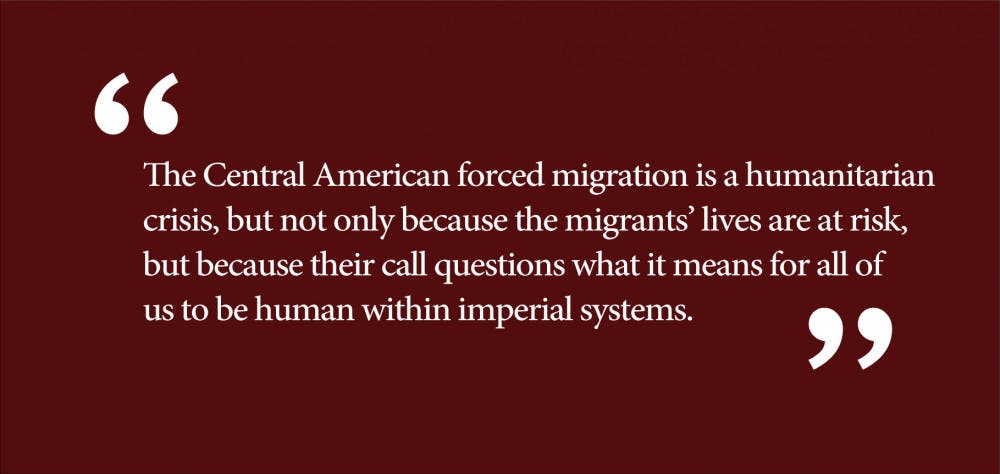The unprecedented form of mass migration of Central Americans has defeated typical government responses to prevent poor people and refugees from migrating to the United States. As we have seen in the last few days, it has also inflamed the U.S. government’s violent treatment of migrants. I want to analyze the form that this migration has taken because, at its core, it is an anti-imperial call to all humans spectating. It is a call that our governments do not want us to understand. I want to amplify the urgent call of thousands of Central Americans now asking for our help and posit this call as an opportunity to resist living within imperial structures.
This humanitarian crisis is a direct product of the imperial systems set up through colonialism, or what Aníbal Quijano, the Peruvian sociologist, has called the “coloniality” of power and global capitalism. Under coloniality, the accumulation of political and economic power is in the hands of a few descendants of Europeans (both whites and mestizos, mixed-race individuals with European heritage). The United States has intervened militarily in Central America since the region’s independence from Spain, and most recently in the second half of the 20th century, to ensure the unequal distribution of land and the exploitation of resources by multinational companies. During the Cold War, this was done in the name of containing the spread of communism, as former president Ronald Reagan would state in his address to the nation in 1984. For many indigenous and poor people, this meant that the Central American elites would continue to own stolen land and maintain political power through corruption and force.
The transnational movement of these migrants has defied the imaginary space of the borders mapped by the nation-states, borders that depend on violence to manage human movement. The first group of people to leave from Honduras Oct. 13 was estimated to be about 3,000 people. Given that they overwhelmingly outnumbered the Guatemalan police force at the border, the Honduran migrants simply started walking across the border after a couple hours of waiting, leaving the police unable to contain them. As the group went into Guatemala in the following weeks, more people from El Salvador and Guatemala joined despite threats from their governments and from the governments of Mexico and the United States. The name caravan attempts to describe a choreographic tactic of mass movement that has effectively challenged and defeated the hostility inherent in national borders. In transgressing two national borders, as they entered the state of Mexico, the migrants have successfully contested the grip of coloniality in our imaginations and bodily movements.
President Trump has threatened to withdraw U.S. aid from Honduras if the migrants were not stopped. U.S. direct intervention is not unprecedented in Honduras; in fact, current Honduran President Juan Orlando Hernández reached power via fraudulent elections supported by the United States. Notably, the aid given to Central American governments does not affect poor communities and the conditions they are escaping. If the United States really wanted to stop the exodus of marginalized Central Americans, it should support anti-corruption legal procedures and do more to hold political leaders in the region’s governments accountable.
This, of course, will not happen because the U.S. government depends on its grip on Central American governments to advance imperial, neoliberal economic policies that exploit Central American laborers and serve the profits of transnational companies. The threats and measures being proposed by these governments reflect the enduring power of coloniality. The call of these migrants exists outside of this colonial regime. These people are at the end of colonial time. In other words, their lives will end, just like many of the people around them, if they stay in their home countries. One single mother in the caravan justifies fleeing to avoid the killing of her son in the same way her husband had been killed: “Some people say that we are exposing ourselves by traveling so far, but this is nothing compared to everything that we face in Colón.”
Central American migrants are stepping into a different temporality, a different experience of time, to survive. These migrants are engaging with the reality that they are in the end times — a phenomenon Professor of Theater Arts and Performance Studies Patricia Ybarra has observed in the works of Latinx playwrights writing about migration. This experience of time has moved them out of the colonial understanding of time and space that prohibits them from walking to the United States to escape their plight. The end times brings with it the possibility to end coloniality.
The sustenance of this anti-imperial movement has so far depended on the solidarity of others along the way. People in Guatemala and Mexico have organized themselves to provide food, shelter, medicine and transport for the migrants. It is the involvement of non-governmental agents that has ensured that these desperate human beings do not succumb to the system that has been and is ready to let them die from starvation and other forms of state violence. These active spectators, as part of a global audience, have decided to sustain this anti-imperial phenomenon, thereby not only saving lives but also opening up a possibility for a decolonial movement — one that disregards the temporal, spatial and spiritual grip of coloniality.
I am not trying to romanticize this mass exodus. The harsh reality is that decolonial movements are met with extreme violence from nation-states. So far, as I have argued, the form of this migration and responses of solidarity have overwhelmed the colonial responses. Yet, the destination of this movement is the territory occupied by the most violent and richest modern empire, the United States. Trump has said that if the migrants at the border throw rocks, the military should open fire as if the rocks were rifles, justifying military action by stating that the Central American migrants are not real asylum seekers. Tear gas has already been thrown at migrant families. I am worried. Here lies the migrants’ call to us all, to the global audience, in Mexico, the United States and elsewhere.
I am calling into question the voice that looks at this humanitarian crisis and tells us that these fellow human beings are separate from us. The call is to resist an imperialism that prohibits us from looking beyond borders. Let’s follow the lead of others in Central America who have organized in solidarity and against the coloniality pursued by our governments. The anti-imperial call I am outlining is a survival tactic, and it is also a call for us to not be imperial agents who refuse to acknowledge the humanity of those at our doorstep, to reclaim our existence in a non-imperial world. In this sense, the Central American forced migration is a humanitarian crisis, but not only because the migrants’ lives are at risk, but because their call questions what it means for all of us to be human within imperial systems. Better yet, it asks us to stand together outside of imperial time and space.
Marlon Jiménez Oviedo GS can be reached at marlon_jimenez_oviedo@brown.edu. Please send responses to this opinion to letters@browndailyherald.com and op-eds to opinions@browndailyherald.com.





